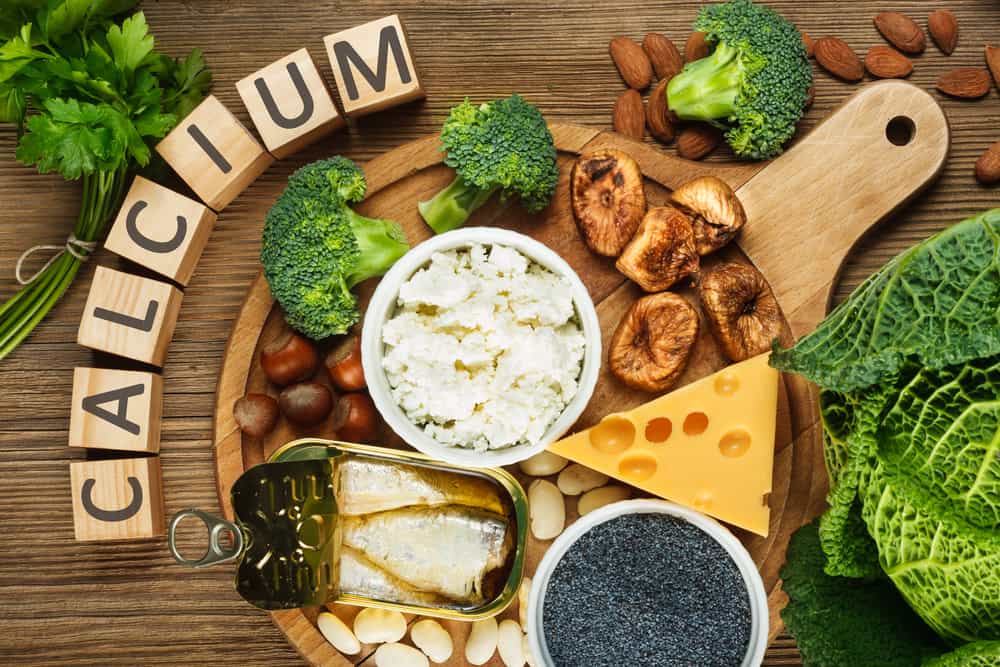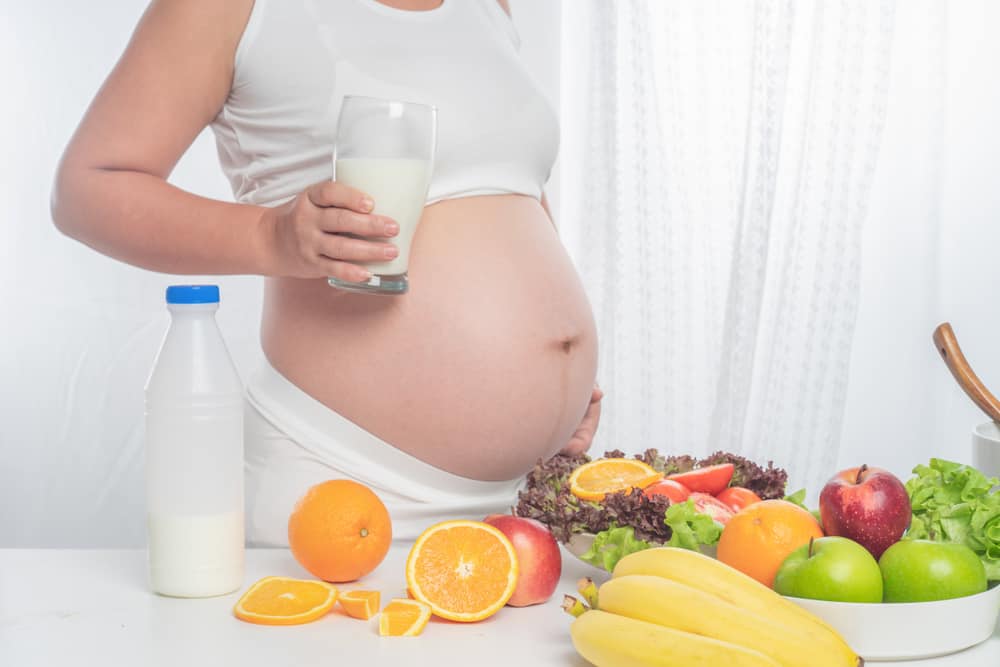Pregnant women will have slightly different dietary and nutritional needs than non-pregnant women. They’ll need to get more protein, iron, folic acid and calcium in their diet in order to support the growing fetus. If the fetus isn’t receiving sufficient nutrients, it will be more susceptible to developing birth defects or weak organs.
Calcium in particular is one of the most important nutrients that pregnant women need to monitor their intake for. Without enough calcium, both the baby and the mother will suffer. It’s a mineral that is needed to maintain the health of the mother’s bones and keep the muscles energized. It’s also important for the baby during development.
Unfortunately, despite being one of the most important nutrients, calcium does not really get a lot of the spotlight in comparison to folic acid and vitamin D. The good news is that getting the 1,000 mg of calcium that is recommended for most women is fairly simple, whether reached through a diet high in diary products, nuts, or leafy greens, or through supplementation.
How Much Calcium Does a Pregnant Woman Need?
The National Institute of Health recommends that pregnant and breastfeeding adults get at least 1,000 mg of calcium while pregnant and breastfeeding teens get at least 1,300 mg of calcium every day. The upper limit is 2,500 mg and 3,000 mg, respectively.
Teen moms need even more calcium than adult moms, as their bodies are still growing. In addition, pregnant women who are planning to breastfeed also need to get more calcium, as they’re going to lose 3% to 5% of their bone mass to breastmilk. This is because a baby needs a lot of calcium, and they’re going to get it from their mother’s existing calcium reservoir.
As the fetus develops and grows, their need for calcium will increase. Studies show that a 20-week-old fetus absorbs 50mg of calcium a day from their mother. This increases to 330 mg a day once the fetus reaches 35-weeks-old.
The amount of calcium that each mother loses will depend on the amount of breastmilk that they produce and how long they plan on breastfeeding. Once the mother stops breastfeeding, they’ll usually recover their bone mass quite rapidly.
Benefits of Getting Enough Calcium
Getting enough calcium during pregnancy is good for both the mother and the baby, which is why it’s important that pregnant mothers keep track of their intake. Calcium is responsible for:
- Helping the baby develop and grow. In particular, calcium is known to strengthen the baby’s developing bones, muscles and cardiac tissues.
- Fortifying the mother’s breast milk. This is where most babies get most of their nutrients from.
- Keeping both baby and mother at a healthy weight. Recent studies have shown that diets high in low-fat dairy foods may encourage fat cells to produce less fat. This may help keep both the mother and the baby at a healthy weight.
- Keeping the pregnant mother’s bones strong. The mother needs to support a lot of weight thanks to their growing baby. Having strong bones will ensure that the mother stays active.
The benefits are for both the baby and the mother. A lot of different benefits can be reaped from calcium, as it is responsible for regulating so many bodily functions and chemical pathways. It’s needed in bone, cardiac and muscle growth, as well as energy maintenance.
Calcium-Rich Foods to Eat

For many pregnant women, the most difficult thing for them during pregnancy is to watch what they eat. They might have cravings for unhealthy junk food and they might dislike the taste of healthy snacks that are great for their body. Some pregnant women will find that their cravings do a complete 180. Foods that they hated before are now items that they cannot get enough of.
Knowing which food items are rich in calcium can help many pregnant mothers plan out their meals. In order to ensure that they’re getting enough calcium in their diet, pregnant women should try to incorporate more of the following ingredients into their meals:
- Beans
- Cheese
- Leafy greens
- Lentils
- Milk
- Nuts
It’s possible that none of the above food items sound appealing at all. Fortunately, there are some food items on grocery shelves that have calcium added to them. Calcium-fortified cereal is a great example! One bowl of cereal can more than meet a pregnant woman’s daily requirements!
Another important thing to note is that it’s important to also get enough vitamin D. Vitamin D helps the body to absorb calcium more efficiently. It can also be absorbed through exposure to sunlight, so pregnant women should try to get in the sun for a bit because it could help their body better absorb all types of vitamins and minerals.
Easy Ways to Get More Calcium
Adding more calcium-rich foods into your diet doesn’t have to be difficult. It’s not like the mothers have to completely switch up their diet at all. In fact, here are some simple ways to incorporate more calcium-rich foods into meals:
- Add a little bit of cheese onto everything — salads, soups and more!
- Have a latte in the morning
- Eat calcium-fortified cereal for breakfast
- Substitute ingredients with some dairy products, like milk instead of water in oatmeal
- Eat more snacks throughout the day, like a bowl of ice cream or even some chocolate-covered almonds
- Eat more salads with leafy greens, almonds and other calcium-rich foods
It’s easy for vegans and vegetarians to incorporate calcium-rich foods into their meals, too. Those who are lactose intolerant can simply avoid dairy products and opt to include more leafy greens or other calcium-rich products instead.
Lactose intolerant individuals may also want to consider switching to soy beverage instead. Some people really can’t tell the difference if they replace milk with soy milk in certain recipes. Note that some soy milks have more of a nutty taste than others. Those who dislike the taste should try a different brand to see if it makes a difference.
Calcium Supplements
Pregnancy does different things to different women. Due to hormonal changes, sensitivities to smell and taste and nutritional needs, different women will have different cravings. Some pregnant women will notice that they can no longer tolerate certain flavors that they may have adored prior to the pregnancy.
Pregnant women who no longer have stomachs that can tolerate calcium-rich foods should consider taking calcium supplements instead. This is a very easy way of ensuring that a pregnant mother is meeting their daily calcium intake requirement.
There are three different types of supplements that contain calcium: prenatal vitamins, calcium carbonate and calcium citrate. All have their unique advantages and drawbacks, which we will explore below.
Prenatal Vitamins

“We found no evidence to recommend that all pregnant women should take prenatal multinutrient supplements beyond the nationally advised folic acid and vitamin D supplements, generic versions of which can be purchased relatively inexpensively” – Drug and Therapeutics Bulletin
Many pregnant women will take prenatal vitamins before and during pregnancy to support their baby. Many others will continue to take these vitamins during postnatal lactation. These vitamins are supposed to contain all of the vitamins and minerals that a pregnant body needs. However, studies show that these vitamins aren’t always needed.
Prenatal vitamins contain surprisingly little calcium. The actual amount varies from one brand to another, but these vitamins definitely do not contain enough to cover one’s daily requirements. They are, however, great supplements and do contain other useful vitamins and minerals.
Those who already consume quite a bit of calcium-rich foods and just need a little pick-me-up can really benefit from these supplements.
Calcium Carbonate
Calcium carbonate is an antacid that is often taken to treat upset stomachs. It’s best taken with food and is one of the cheapest methods of getting calcium during pregnancy because these pills are extremely affordable.
This is a great option for pregnant women who are on a budget or who would also like a supplement that can help treat upset stomach and heartburn. Both of those symptoms are incredibly common during pregnancy and can be caused by hormonal and bodily changes.
Calcium Citrate
Pregnant women who simply aren’t getting enough calcium in their diet due to any reason might want to consider taking calcium citrate supplements instead. In fact, this is the most common type of calcium supplement recommended for pregnant women.
These pills can be taken on an empty stomach and are great for pregnant mothers who either can’t stomach anything at all or simply don’t have any appetite. Best of all, this supplement can also treat osteoporosis, weak bones, muscle diseases like latent tetany and hypoparathyroidism.
When Should I Take Calcium Supplements?
Although it’s always a good idea to get an early start, it’s important to remember that most babies do not start to absorb a large amount of calcium until the second half of pregnancy. As the baby develops, pregnant mothers should begin to take notes of the amount of calcium that they consume on a day-to-day basis.
Those who are not getting enough calcium should look into either adding more calcium-rich foods into their meals or taking calcium supplements. As pregnancy can come with some weird surprises, it’s always a good idea to start incorporating these supplements and foods earlier on during the pregnancy.
Insufficient Calcium Intake
Not having enough calcium during pregnancy can lead to some very serious health complications for both the baby and the mother. Depending on the amount of calcium that the mother is getting, the severity of the health complications will vary. Some of the more common issues can include:
- A higher susceptibility for osteoporosis within the mother
- Bad breath from the mother
- High blood pressure for the mother during pregnancy
- High lead content within the mother
- Low birth weight
- Premature birth
- Poor overall fetal development
- Weak bones for the mother
Most mothers will, however, get enough calcium that it shouldn’t affect them that much. In most situations, the worst thing that can happen to the baby is a low birth weight, a premature birth or has slowed development.
With that said, there have been some unique circumstances where insufficient calcium led to death. Other serious and horrifying issues that can emerge from a lack of calcium include hypertensive disorders, like eclampsia and preeclampsia.
Excessive Calcium Intake
Getting too much calcium during pregnancy can also be equally as problematic. Fortunately, this isn’t an issue that happens often, as most pregnant women tend to be getting not enough calcium rather than too much. In general, the only time that a pregnant woman is getting too much calcium is if they are taking too many calcium supplements.
The health complications related to excessive calcium intake include:
- Arrhythmia
- Constipation
- Difficulties absorbing other vitamins and minerals
- Kidney stones
- Low calcium within the baby’s body
While the mother is more likely to experience side effects like constipation and kidney stones, the baby will actually experience side effects that are associated with not having enough calcium. In fact, the baby will be at risk for hypocalcemic seizures, which are seizures associated with not having enough calcium.
Be Careful With Calcium

To avoid any unnecessary stress and health issues, pregnant women must ensure that they are getting enough calcium every day. They should track their diet and their nutritional intake to see whether they are falling short of any nutritional goals, whether it be for calcium or other vitamins and minerals.
Those who are confused about whether they are on the right track or not should highly consider speaking with a medical professional. It never hurts to get a checkup. Some pregnant women will even meet up with nutritionists to confirm that they’re consuming a healthy diet. After all, you’re no longer eating for only yourself. You’re eating for your baby’s wellbeing as well!
